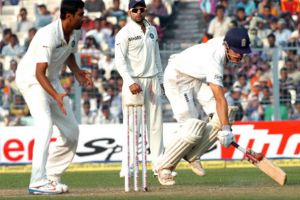
England's ascendancy after two days of play in the Eden Gardens Test has served up a timely reminder of some deep-rooted problems in Indian cricket. There are worrying signs that the team may not be so much in transition as in precipitous decline.
Judging by the poor batting performance on a flat Eden surface and the sub-par bowling, the defeat on a rank turner in the last Test in Mumbai does not seem an aberration. It could just be a logical progression from the losses in England and Australia over the last year, although on very different kinds of pitches.
As captain Alastair Cook marched away to a record 23rd century for England on Thursday in excellent batting conditions, India's supposed supremacy in home conditions seemed distant memory.
Firstly, there's the retirements of two great batsmen. There's an inconsistent opening combine,a dodgy middle and lower-middle order and the lack of convincing new bowling talent in either the spin or pace department. All these problems have forced India to increasingly rely on luck and stray individual brilliance to wriggle out of tough situations.
Both have continued to elude them more often than not in the recent past.
The problems begin with captain MS Dhoni, who continues to take some questionable decisions in the field and looks lost and defensive when his plans don't work out. The tendency to give away easy singles and give spinners short spells have come under the scanner. Under pressure to justify his place in the side of late, Dhoni finally came good with the bat but not before betraying a lack of conviction by asking for turners when his team clearly couldn't match England's skill and confidence.
The hosts have been out-bowled , out-thought and outclassed by Cook's men. Has Dhoni been too obsessed with the pitches to focus on these shortcomings?
With Umesh Yadav, who looked impressive in Ahmedabad, out with injury, the bowling resources are threadbare. Zaheer Khan is clearly in decline and his strike rate — the average number of balls bowled per wicket taken — is a steep 98.5 this year. He started well on Thursday but has generally failed to inspire the fast-bowling flock. Ishant Sharma's comeback looked undeserving as after a good start, he too faded away. His last 4 Tests have fetched Ishant a strike rate of 208 and only 3 wickets. Was it a mistake to pick him over local lad Ashok Dinda, whose domestic record continues to impress?
The spinners — Pragyan Ojha and R Ashwin — are still young and finding their feet. They were guilty of straying in line all too often and have not looked half as effective as the England duo of Panesar and Swann. The highly-rated Ashwin has been guilty of trying too many things and losing the plot. Maybe, they could do with the guiding hand of a spin bowling coach.
Worse, there doesn't seem to be a second-rung of bowlers capable of holding their own in Tests.
Then there's India's problems with the bat, which caused this predicament at Eden in the first place. The batsmen again performed below par, much like they have in the past year and half, but this time it was on a friendly home surface. Sadly, India's batsmen are not masters of playing spin anymore and they continue to be suspect against the faster stuff.
Virat Kohli hasn't justified his billing and Yuvraj Singh's Test career may not undergo a grand resurrection after all. There is no Dravid or Laxman to hold things together. Tendulkar is nearing the end and Sehwag and Gambhir are too inconsistent to be relied upon.
Only Cheteshwar Pujara offers hope but he is a baby in Test cricket, even if he has taken some giant steps.
This leaves India without a dependable rock in the batting, one who the team feels confident will do his job and around whom the rest can bat. From a situation not so long ago when there were three of them — Dravid, Sachin and Laxman — the cupboard is almost bare. It's been a crippling blow.
Of course, Dhoni and Co will be looking to pull things back in the series. If they don't , convincing Test wins like the one in Ahmedabad in the first Test may soon become blips on the radar rather than the norm. A cricket-crazy nation may have to reconcile to a long period of lowered expectation.
By playing into the talk of a 'revenge series' and aiming to blow England away on rank turners, Dhoni & Co forgot to confront their deepest fears: that man to man, England may be the better team, no matter the conditions.





Comments
Add new comment